New BrunswickA year after the New Brunswick government eliminated the last legal limit on access to surgical abortions, the same three hospitals are the only places where the procedure is offered, and doctors are showing less interest in providing the service.No non-hospital clinics are offering surgical abortions, despite repeal of Medicare funding banJacques Poitras · CBC News · Posted: Nov 06, 2025 5:00 AM EST | Last Updated: 3 hours agoListen to this articleEstimated 5 minutesHealth Minister John Dornan says the interest to offer surgical abortions from community practices has decreased. (Victoria Walton/CBC)One year after the New Brunswick government eliminated the last legal limit on access to surgical abortions, there’s been no real change to where the service is available.Three hospitals in two cities are still offering the service, but no clinics outside hospitals have taken advantage of the Nov. 7, 2024, regulatory change.Doctors who were prepared a year ago to offer it in their practices in communities seem to be “less interested” than they were, according to Health Minister John Dornan.“That’s up to the individual practitioners,” he said.“They haven’t stepped up to say ‘We want to start to do this,’ and so if they do, we are ready to be able to support that, but the community of physicians who would do this have not asked us for that, thus far.” WATCH | ‘We are ready to be able to support that’: Minister says barriers remain:Access to surgical abortions still limited to 3 N.B. hospitals A year after policy change on funding surgical abortions, wider access remains a work in progress. Martha Paynter, a reproductive health researcher who is part of the New Brunswick Abortion Care Network, says it’s not a surprise. “We didn’t expect there to be a new clinic right away,” she said. “The demand for procedural abortion is falling year over year, and the resources it would take to start a freestanding clinic would be quite significant.”Just days after being sworn in last fall, Premier Susan Holt repealed a section of a provincial regulation that said Medicare could only fund surgical abortions in hospitals.It marked the end of a long political battle that centred on Clinic 554, a practice in Fredericton’s downtown that lobbied for Medicare to fund abortions performed there.“We believe that abortion is health care and that everyone deserves access to the care that they need, when and where they need it,” Holt said at last year’s announcement, where she held up the cabinet order that repealed the restriction.But she also said that surgical abortions “will not become [more] accessible tomorrow” as a result of the change.Premier Susan Holt holds the cabinet order officially repealing the ban on Medicare funding for procedural abortions performed outside hospitals. (Jacques Poitras/ CBC)Dornan and Paynter both said the main reason doctors have not added the service to their clinics is the growing use of medication abortions.The province funds Mifegymiso, a combination of two pills that any doctor or nurse practitioner can prescribe that terminates a pregnancy and is less intrusive than surgery.The province funded 724 claims for prescriptions in 2020-21, a number that rose to 1,224 last year.This year, the number is on pace to exceed 1,300.“Year over year, we’re seeing these scrips increase, increase, increase, and the abortion rate itself is not rising,” Paynter said.“We know that from national data. So we can presume that more and more people are choosing medication abortion.” That means the preoccupation with access in a physical facility is increasingly outdated, Paynter said, pointing to a primary care clinic in downtown Fredericton, where a number of doctors and nurse practitioners prescribe Mifegymiso.They can also prescribe it virtually.“The terrain has changed so much,” Paynter said.Questions remain, however.Mifegymiso is not prescribed after the ninth week of a pregnancy, and patients who need surgical abortions must still travel to the only hospitals offering them, in Bathurst and Moncton, which Dornan says can represent a barrier.Paynter said there’s a scarcity of data on how many patients have to make the trip and how long it takes, and on whether delays are being reduced. “We think we’ve improved things but we really need that data … to be able to answer that in a really precise way.” Martha Paynter is a reproductive health researcher who is part of the New Brunswick Abortion Care Network. She said there’s a need for data on people travelling for abortions. (Mikael Mayer/Radio-Canada)Some patients who are misinformed about the service, or who don’t know how to access the service, may wait too long and be forced to travel outside the province late in their pregnancies.The minister said he’s “pretty confident” many don’t understand “the subtleties” of the various options.“They might not know where to turn,” he said.A promised toll-free phone line will launch “very soon,” dedicated to providing patients with more information about their options and how to navigate the system, Dornan said.He’ll also look at whether more data on travel to Moncton and Bathurst can be made available.He said his “gut feeling” is that the travel remains a barrier for some patients, and he urged advocacy groups to let the department or doctors know about people they may not otherwise hear from. Dornan also said universal contraception coverage, promised in the 2024 Liberal throne speech, will happen, whether a pharmacare agreement is signed with the federal government or not. ABOUT THE AUTHORJacques Poitras has been CBC’s provincial affairs reporter in New Brunswick since 2000. He grew up in Moncton and covered Parliament in Ottawa for the New Brunswick Telegraph-Journal. He has reported on every New Brunswick election since 1995 and won awards from the Radio Television Digital News Association, the National Newspaper Awards and Amnesty International. He is also the author of five non-fiction books about New Brunswick politics and history.
N.B. abortion access a work in progress one year after policy change











